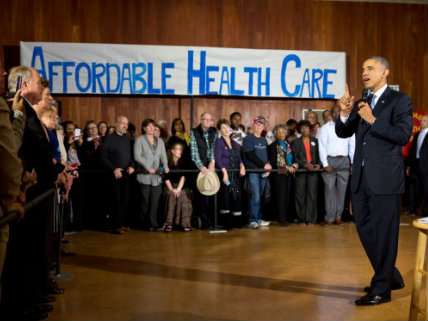Obama Administration Dramatically Scales Back Expectations for Second Year Obamacare Enrollment

The Obama administration now says it expects the second year of Obamacare to see dramatically fewer enrollments than originally projected, and that hitting its long-term enrollment goals will likely take years longer than initially believed.
By next year, the Congressional Budget Office (CBO) estimated last April, enrollment in private health plans under Obamacare would increase from its current level to 13 million people, up from its current level of 7.1 million (a number that has fallen from the 8 million or so the administration said had signed up in April.)
But the Obama administration has consistently declined to endorse this second-year projection as a target for the health law's second open enrollment period—a telling refusal given that the CBO's first year enrollment projection was a key metric in assessing the first year's outcomes.
But the administration announced today that it now expects the figure to rise to somewhere between 9 and 9.9 million. So instead of adding almost 6 million people to the coverage rolls, it will add fewer than 3 million. That's a reduction of at least 50 percent, using the administration's current 7.1 million enrollment baseline (the CBO had projected that enrollment would rise from a starting point of 6 million).
In addition, administration officials said that they believed enrollment would likely not hit the CBO's ultimate projection of 25 million private plan enrollments—essentially full enrollment—until 2019 or 2020, three years later than the CBO projected.
This is a fairly significant rollback of expectations for Obamacare, and while it might be a way of lowering the bar so that an underperformance looks like a relative success, it suggests that the administration is anxious about enrollment trends for year two. The second year of enrollment was always going to be somewhat more difficult, because the people most motivated to purchase plans through Obamacare's exchanges were likely to have bought in year one. The task of year two would be to motivate even more people, those who weren't already interested in purchasing coverage through the exchanges.
What this announcement indicates, then, is that the administration thinks it's going to have a hard time motivating many people to purchase plans, which is another way of saying fewer people than expected seem to want or believe they need insurance under the law. For whatever reason or reasons, the demand isn't there, and Obamacare is now expected to underperform as a result.
